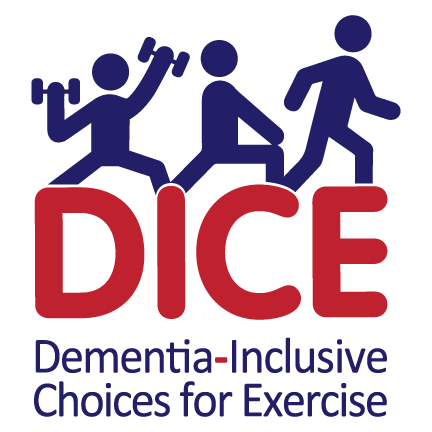The DICE Toolkit
DICE Training Manual
The DICE Training Manual gives you the knowledge and skills to enable you to support and include persons living with dementia in your exercise programs. It is intended to accompany the DICE training module.
Physical Activity Guidelines for People Living with Dementia
‘It’s time to get active’ was developed by the Ontario Brain Institute, and revised in partnership with the DICE Team. This resource shares information about general recommendations for physical activity and strategies to get active.
DICE Wallet Card – People with dementia
This foldable resource is to help people with dementia to communicate their abilities, experiences and preferences. This will help exercise providers understand and adapt to the individual.
DICE Wallet Card – People with memory problems
This foldable resource is to help people with memory challenges to communicate their abilities, experiences and preferences. This will help exercise providers understand and adapt to the individual.
Video: I have dementia but I am still me
This video shows the diverse faces and experiences of people with living with dementia, and their family, friends, and supporters. The video was produced by the DICE Team.
Video: Staying active helps me live well with dementia
This video introduces the broad benefits of physical activity for people living with dementia. This video was produced by the DICE Team.
Video: Dementia-inclusive exercise, A little support goes a long way
This video discusses how small supports and adaptations can help support inclusion of people living with dementia in exercise, sport and recreational programs and activities.
Understanding Dementia
iGeriCare
iGeriCare is a free, online dementia education program developed by experts in geriatrics, mental health and online learning at McMaster University.
Understanding Dementia
Wicking Dementia Research & Education Centre offers a “Massive Open Online Course” (MOOC) about dementia. This course offers university-quality education about the latest in dementia research and care.
Dementia and Sensory Challenges
This resources highlights key sensory challenges some people with dementia may face. It was developed by Agnes Houston, a person living with dementia.
Click here to download
Talking Sense. Living with Sensory Changes and Dementia
This resource provides an expanded description of the the senses, the impact of ageing and the impact of dementia. It includes tips on self-management for persons living with dementia and advice for families and care partners.
World Alzheimer Report 2012: Overcoming Stigma
To learn more about the stigma of dementia, this resource brings together expert opinion from people directly affected by the disease and those working in the field
Alzheimer Society of Canada
The Alzheimer Society of Canada website provides information on different types of dementia, programs and resources available, and the latest news from research and practice.
Click here to visit
Person Centred Language
Behavioural Supports Ontario provides resources to support person-centred language and communication.
Understanding the Rights of People Living With Dementia
Harnessing the UN convention on the Rights of Persons with Disabilities
This resource talks about the use of the Convention on the Rights of Persons with Disabilities as a tool to ensure people with dementia are able to enjoy human rights and access to services on an equal basis with others.
UN Convention on the Rights of Persons with Disability
The UN CRPD is a human rights treaty that was adopted on December 13th 2006. The purpose of the UN CRPD is to promote, protect, and ensure the full human rights and freedoms of people with disability, including people living with dementia.
Dementia Engagement & Empowerment Project Language Guidelines
The Dementia Engagement and Empowerment Project (DEEP) language guidelines were written by 20 people living with dementia, acknowledging the language we use to talk about dementia influences how people with dementia are viewed and also how they feel about themselves.
The Canadian Charter of Rights for People with Dementia
People living with dementia worked with the Alzheimer Society of Canada to create the Canadian Charter of Rights for People with Dementia.
Alzheimer Society of Canada Language Guidelines
To promote person centred language, these guidelines have been reviewed by people living with dementia and have been developed for use by all individuals involved in the care of people with dementia.
Dementia Australia Dementia Language Guidelines
The purpose of this paper is to promote the consistent use of appropriate, inclusive and non-stigmatizing language when talking or writing about dementia and people living with dementia.
Power of Words
This video talks about the importance of the language and words we use when talking about dementia.
Physical Activity and Dementia
Later Life Training. Planning for I can.
This document is designed to provide information about the person and assist the exercise professional build up a picture of the person as part of a person-centred assessment.
Otago Exercise Programme
This resource describes the practical implementation of a strength and balance retraining programme, which has been shown to reduce falls.
Exercise Interventions for Dementia and Cognitive Impairment
This paper describes a series of evidence-based interventions designed to increase physical activity in persons with dementia and mild cognitive impairment.
Perspectives of people living with dementia on physical activity
Late Life Training developed this document to share the views, interests, experiences and the challenges of persons living with dementia in taking up and/or continuing a range of physical activities during their dementia journey.
Reach the Person behind the Dementia
This paper explores physical therapists’ (PTs) experiences and reflections on facilitating high-intensity functional exercise with older people living with dementia, in residential care home setting.
The Brain-Body Connection
This document outlines recommendations from the Global Council on Brain Health on physical activity and brain health for people as they age.
Alzheimer Society of Thunder Bay: Checklist for the physical environment
This resource helps to evaluate and improve the physical environment to improve accessibility for people with dementia.
Alzheimer’s Australia NSW
This document provides an in-depth review of the benefits of physical activity to people living with dementia and people at high risk of dementia.
